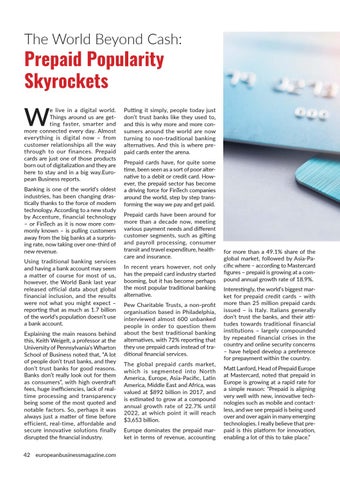The World Beyond Cash:
Prepaid Popularity Skyrockets
W
e live in a digital world. Things around us are getting faster, smarter and more connected every day. Almost everything is digital now – from customer relationships all the way through to our finances. Prepaid cards are just one of those products born out of digitaliza on and they are here to stay and in a big way.European Business reports. Banking is one of the world’s oldest industries, has been changing drascally thanks to the force of modern technology. According to a new study by Accenture, financial technology – or FinTech as it is now more commonly known – is pulling customers away from the big banks at a surprising rate, now taking over one-third of new revenue. Using traditional banking services and having a bank account may seem a matter of course for most of us, however, the World Bank last year released official data about global financial inclusion, and the results were not what you might expect – repor ng that as much as 1.7 billion of the world’s popula on doesn’t use a bank account. Explaining the main reasons behind this, Keith Weigelt, a professor at the University of Pennsylvania’s Wharton School of Business noted that, “A lot of people don’t trust banks, and they don’t trust banks for good reasons. Banks don’t really look out for them as consumers”, with high overdraft fees, huge inefficiencies, lack of realtime processing and transparency being some of the most quoted and notable factors. So, perhaps it was always just a ma er of me before efficient, real-time, affordable and secure innovative solutions finally disrupted the financial industry.
42 europeanbusinessmagazine.com
Pu ng it simply, people today just don’t trust banks like they used to, and this is why more and more consumers around the world are now turning to non-traditional banking alterna ves. And this is where prepaid cards enter the arena. Prepaid cards have, for quite some me, been seen as a sort of poor alterna ve to a debit or credit card. However, the prepaid sector has become a driving force for FinTech companies around the world, step by step transforming the way we pay and get paid. Prepaid cards have been around for more than a decade now, meeting various payment needs and different customer segments, such as gi ing and payroll processing, consumer transit and travel expenditure, healthcare and insurance. In recent years however, not only has the prepaid card industry started booming, but it has become perhaps the most popular tradi onal banking alterna ve. Pew Charitable Trusts, a non-profit organisation based in Philadelphia, interviewed almost 600 unbanked people in order to question them about the best traditional banking alterna ves, with 72% repor ng that they use prepaid cards instead of tradi onal financial services. The global prepaid cards market, which is segmented into North America, Europe, Asia-Pacific, La n America, Middle East and Africa, was valued at $892 billion in 2017, and is es mated to grow at a compound annual growth rate of 22.7% until 2022, at which point it will reach $3,653 billion. Europe dominates the prepaid market in terms of revenue, accoun ng
for more than a 49.1% share of the global market, followed by Asia-Pacific where – according to Mastercard figures – prepaid is growing at a compound annual growth rate of 18.9%. Interes ngly, the world’s biggest market for prepaid credit cards – with more than 25 million prepaid cards issued – is Italy. Italians generally don’t trust the banks, and their a tudes towards traditional financial institutions – largely compounded by repeated financial crises in the country and online security concerns – have helped develop a preference for prepayment within the country. Ma Lanford, Head of Prepaid Europe at Mastercard, noted that prepaid in Europe is growing at a rapid rate for a simple reason: “Prepaid is aligning very well with new, innova ve technologies such as mobile and contactless, and we see prepaid is being used over and over again in many emerging technologies. I really believe that prepaid is this pla orm for innova on, enabling a lot of this to take place.”
